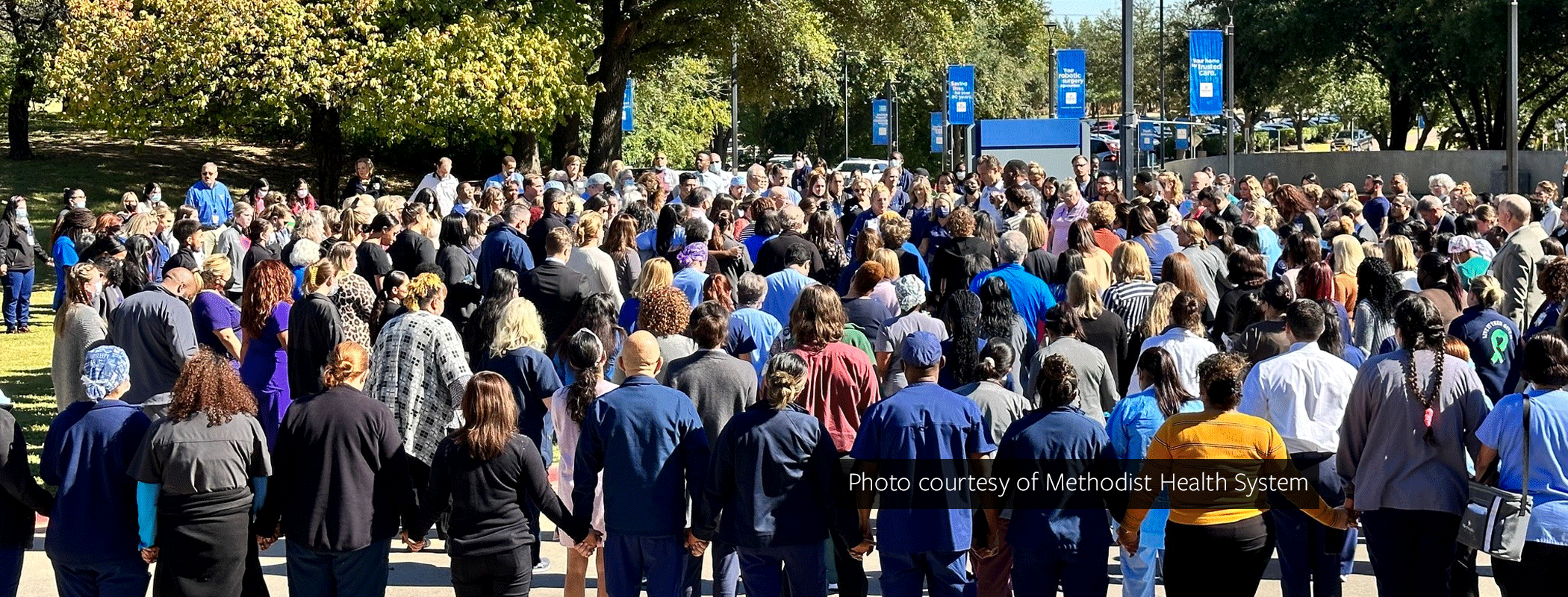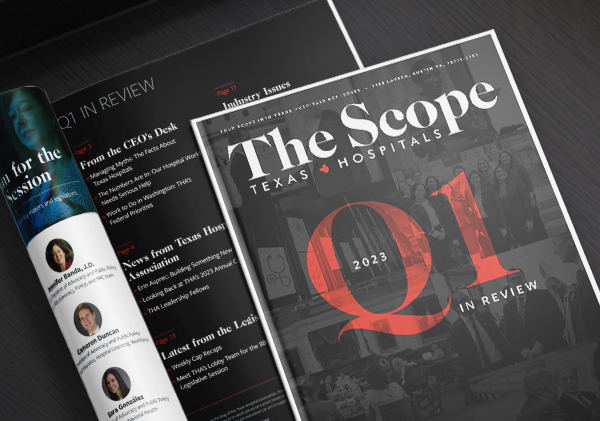Workplace violence can change a hospital worker’s life in a horrifying flash – whether that moment involves a gunshot or even an unarmed violent outburst. Hospital workers will often rebound from such incidents with severe emotional trauma. They may even decide that rebound won’t include continuing their work in the same setting.
Suzanne Magee, the emergency department director at Titus Regional Medical Center in Mt. Pleasant, saw it happen mere weeks ago, when an incident involving a patient caught her and her ED staff completely by surprise. It happened without the buildup of anger or frustration that often warns hospital workers that a person is on the precipice of violent action.
“Usually you can see people escalate, and so you have the opportunity to intervene, to deescalate them, to prevent the violence. [With] this person, that’s not how it happened,” Magee said. “This person just jumped up and went after every human being that they saw in the emergency department – actually got a hold of several of my staff members before we were able to stop it.
“The next day, I got an email from one of my nurses, and it was so sad. Because basically, what she was telling me was, ‘I want to orient to case management, I want to orient to informatics and I want to orient to billing and coding.’ Which basically means, ‘I want anything except patient care. I want away from the bedside.’ And this was a young nurse, and really a good one.”
At a time when many factors are driving a critical shortage in Texas’ hospital workforce, the Texas Hospital Association is hoping the Texas Legislature will sign off on steps to curb the violence that has increasingly plagued health care facilities since the start of the COVID-19 pandemic. As Magee noted moments later, “Nurses leaving the bedside is really not something that we can afford at all right now. Especially experienced, good nurses. We really can’t afford to lose any more, because there’s nobody out there to replace them right now.”
Bills the Legislature has in front of it would mandate workplace violence prevention plans and committees, increase the penalties for assaulting a hospital worker and prohibit parolees from hospital visitation without express approval from their parole officer, among other steps. During this session, THA is letting lawmakers know about the acute need for ensuring hospitals are safer places to work.
Defining the problem
Violent incidents at hospitals have increased markedly in the past few years, as a recent THA member survey showed – contributing to the attrition that has so many facilities struggling to field adequate staff. The survey showed 98% of Texas hospitals have experienced either the same or increased workplace violence since the start of the pandemic, including 61% that reported violence severity has increased. Nurses, the survey found, have borne the brunt of that uptick.
Survey respondents have overwhelmingly done their part to undertake workplace violence prevention efforts, with 89% of hospitals reporting that they did so. But THA knows hospitals can’t do it on their own – they need backstopping from government action. That’s why workplace violence became a central issue for THA during the 2023 session of the Legislature, which is considering and/or advancing several pieces of legislation to make hospitals safer.
Central to THA’s safer-hospitals agenda is making sure all facilities have personnel dedicated to the cause. Senate Bill 240 by Sen. Donna Campbell, MD (R-New Braunfels) and its companion, House Bill 112 by Rep. Donna Howard (D-Austin) would require hospitals to maintain a workplace violence prevention committee and implement individualized training on prevention at least annually. Committees would have to develop a prevention plan and develop a comprehensive definition of workplace violence. SB 240/HB 112 would also attempt to remove any reluctance to report workplace violence, prohibiting discipline or retaliation for making a good-faith report of such an incident.
Magee believes that bill “will help define the problem,” adding that most violent incidents in emergency departments don’t get reported at all.
“When someone jumps up out of the bed and screams and yells at a nurse and intimidates them and makes them fearful, even if they don’t touch them, it impacts that nurse’s ability to work the rest of that day,” she said. “So it impacts everyone’s care, not just that one individual. But I think that we have to encourage people to report it. And it needs to be clear that violence is not just a physical act – that someone who’s threatening you, or someone who’s screaming and cussing at you, that is workplace violence as well.
“Whether that’s coming from a patient, a family member, a visitor or another staff person, it needs to be reported so that we clearly understand what problem we actually have.”
SB 240 passed the House of Representatives today and now heads back to the Senate to reconcile an amendment, which would then send it to Gov. Greg Abbott’s desk for his signature.
Avoiding Another Methodist
One of the most disturbing hospital violence incidents in recent memory happened in Texas last October, when two workers were killed in a shooting at Methodist Hospital in Dallas. The man now charged with capital murder in the deaths was the father of a child newly born at the hospital and was out of prison on parole. Although he was wearing an ankle monitor at the time of the shooting, he had cut one off earlier in the year, according to news reports.
That tragedy helped spur several other pieces of legislation to address violent hospital incidents, supported by both THA and Methodist Hospital. Those bills, all filed by Rep. Rafael Anchía (D-Dallas), include:
- House Bill 3547 to prohibit parolees from hospital visitation unless a supervising parole officer approves the visit beforehand;
- House Bill 3548 to make it a third-degree felony to assault any hospital worker performing their duties; and
- House Bill 3549, which makes it a felony for parolees to remove their required electronic monitoring devices, and upon conviction to serve their sentence for that offense immediately after completing the sentence for which they were originally on parole.
THA Assistant General Counsel Heather De La Garza, J.D., testified in favor of both HB 3548 and a companion measure, House Bill 2189 by Rep. Julie Johnson (D-Farmers Branch), in March before the House Committee on Criminal Jurisprudence.
Hospital advocates are also keeping their eye out for legislation that might set back hospital violence prevention efforts. Earlier this month, THA testified against House Bill 2960 by Rep. Briscoe Cain (R-Deer Park), which would repeal the law that makes it a criminal offense to not heed a posted sign prohibiting firearms on a premises.
THA General Counsel Steve Wohleb, J.D., who delivered that testimony, explained to The Scope that if HB 2960 passes, “The only way that you can really enforce the prohibition on guns in hospital facilities is to personally approach anyone – presumably the person that we see is in possession of a handgun – and say, ‘Handguns are not permitted on these premises.’ And only if the person fails to promptly depart would you be able to take action against that person and have them prosecuted for being in a place where guns were prohibited.”
All three of the bills filed by Rep. Anchía have been heard in committee and left pending. HB 2960 is also pending in committee.
There’s been a lot to keep up with on The Scope this quarter. This digital flipbook is an additional benefit for THA members only, to give you all the recent news in one place and ensure you’re up-to-date on all things Texas hospitals.
Member login required.



